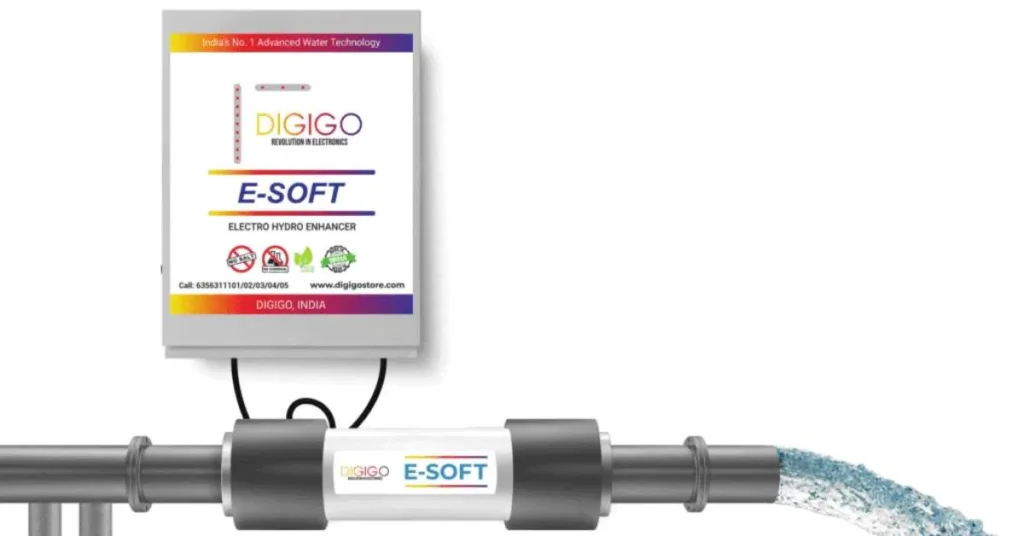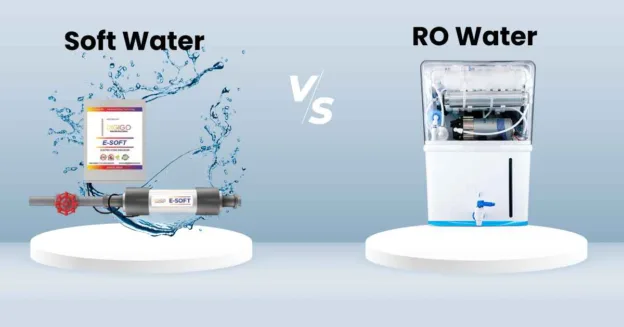Confused about RO Water vs Soft water? This blog guide you difference between Soft Water and RO Water! Discover how RO systems and water softeners work, their benefits, and more. We also share which is truly better for your needs.
What is RO Water?
The full name of RO Water is Reverse Osmosis Water. The process in which water is demineralized and deionized by putting several pressures through a semi-permeable Osmosis Membrane is called Reverse Osmosis. RO Water comes from a specialized machine which turns salt water into a fresh RO Water.
What is Soft Water?
The Water which is converted from Hard Water by removing harmful minerals such as calcium carbonate and ions is called Soft Water. To convert Hard Water or normal water into Soft Water you require a specialized Water Softener System. Soft Water is free from Harmful bacteria’s therefore, it is beneficial for use.
How does RO Water Systems work?
A reverse osmosis system removes sediment and chlorine from water with a pre-filter before it forces water through a semipermeable membrane to remove dissolved solids. After water exits the RO membrane, it passes through a postfilter to polish the drinking water before it enters a dedicated faucet.
How Does the Water Softener System Work?
When Hard Water enters through the pipes, the Water Softener Systems attract ions like calcium and magnesium and detaches it from the Hard Water resulting in the conversion to Soft Water. Then the Soft Water flows through your pipes and comes to use.
Benefits of RO Water
- RO Water can save you from harmful Water Borne Diseases.
- Heavy metals are absent in RO Water, making it healthy to drink.
- Improves Digestion and Metabolism.
- Helps in Weight Loss.
- Helps improve hair and skin.
Benefits of Soft Water
- Save Lots of Money in the Long Run.
- Protect your appliances.
- More efficient cleaning.
- Softer Skin and Hair.
- Soft Water is better for the environment.
Disadvantages of RO Water
- Wastes Significantly More Water Than It Produces.
- Removes Healthy Minerals Present in Water and Decreases pH.
- Costly installation.
- Regular Maintenance. ‘
- increases your risk of cardiovascular and neurodegenerative diseases.
Disadvantages of Soft Water
- Soft water is considered by most experts to be harmful if consumed on a regular basis.
- Regularly drinking Soft Water increases a person’s sodium levels, which can lead to multiple health problems including blood pressure.
- The process used to make the water soft also makes it more volatile, which means it picks up more unwanted elements from your pipes. These elements can include lead, making it potentially more dangerous.
- A water softener wastes up to 120 gallons of water for every 1,000 gallons. If you are charged per water consumption, you could see an increase in your water bill.
- Negative impacts to the environment from salt use.
The above Soft Water side effects are of Normal Water Softeners. These Disadvantages gets washed out with the installation of Digigo E-Soft Water Softeners System. How, You Ask?

- Water from Digigo E-Soft Water Softener System does not affect your health as our water softener system doesn’t use sodium or salt to soften the water.
- No unwanted elements are picked from your pipes with Digigo E-Soft.
- No Salt usage means No Health Problems.
- Our Digigo E-Soft does not waste a single drop of water, it converts hard water into soft water directly without any wastage.
- Digigo E-Soft is environment friendly.
Which is better: RO Water or Soft Water?
RO Water removes partial minerals from the water. Whereas, Soft Water removes complete Hardness from Water making it beneficial for usage as well as consumption. RO Water has less healthy minerals so it can create some deficiency in the future. Soft Water in the long run has no side effects on health. The Bottom Line is that Soft Water is more beneficial as well as advisable to use when compared with RO Water. But Soft Water is only beneficial if the Water Softener System is of good quality. For the Best Quality of Water Softener System, choose Digigo E-Soft. Made in India. Made to protect you from Hard Water. Made to save your appliances. Made to save your money. Made to protect the environment.
